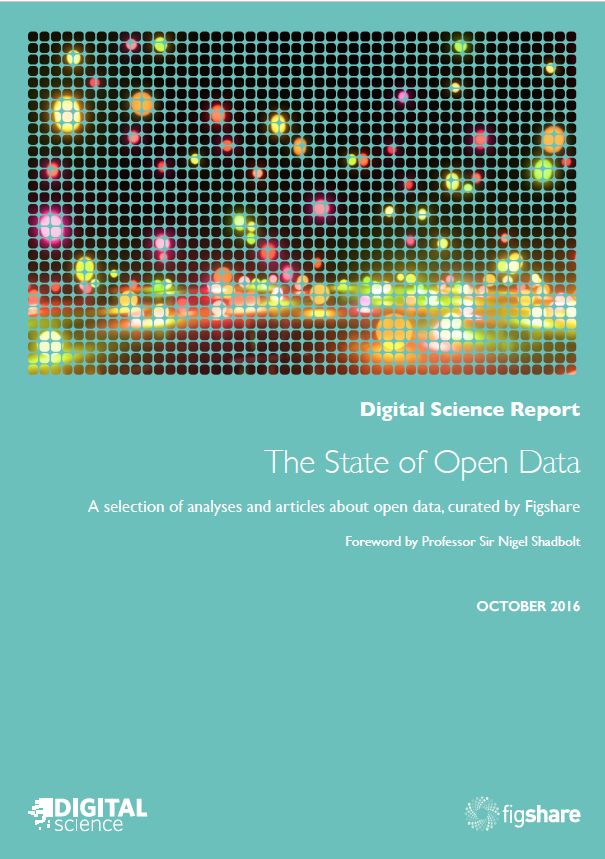
This report has been supported by Digital Science and the survey was conducted in partnership with Springer Nature, BioMed Central’s parent company. It highlights the extent of awareness around open data, the incentives around its use, and perspectives researchers have about making their own research data open.
The key findings of the report include:
For the majority of respondents, open data is already a reality:
“The State of Open Data” – Figshare’s report and survey finds 80% of researchers value data citation as much as, or more than article citation.
Approximately three quarters of respondents have made their research data openly available at some point; a similar number are aware of data sets that are open to access, reuse, repurpose and redistribute.
Researchers in the social sciences demonstrate the highest level of awareness by subject area, while by geography, researchers in Asia demonstrate the least familiarity.
Researchers place value on the credit they receive for making data open:
Nearly 70% of researchers value a data citation as much as an article citation. A further 10% value a data citation more than an article citation.
Awareness of open data transcends age and career progression:
Encouragingly, Principal Investigators (PIs) and Professors consistently responded similarly to PhD students and Post-doctoral fellows in their awareness of open data usage.
Respondents admit to uncertainty and gaps in their knowledge and are hungry for more information, perhaps one set of critical factors that hold back progression in open data sharing:
Of the researchers who have already made their data open, 60% of respondents are unsure about the licensing conditions under which they have already shared their data, and thus the extent to which it can be accessed or reused.
Researchers are uncertain who will meet the costs of making data open.
More than half of respondents said they would welcome more guidance on compliance with their funder’s policy.
Researchers are uncertain of how to cite datasets:
Less than half of respondents say they are confident in how to cite a secondary research dataset.
There are indications that the future will be more open:
Researchers who have never made data openly available are considering doing so – of respondents who have not made any data open to date, 44% will definitely consider doing so in the future, and a further 46% might consider doing so.
Regional differences exist: North American respondents who have not yet made data open are most likely to do so in the future; Asian respondents are least likely to do so.
Digital Science CEO Daniel Hook says:
“Today’s findings show we have reached a key inflection point in the research community – nearly three-quarters of all researchers, whether by mandate or not, state they have made their data sets open and available, and value a data citation as much as an article citation. This clearly demonstrates researchers consider sharing data sets as core to the furthering of research. It is equally clear from the results of the survey that researchers also feel the need for greater support in understanding what is becoming a highly complex and nuanced activity. Understanding copyright, licensing, contractual and ethical concerns around data sharing are key to participating appropriately in the open community. We need to provide the right education to young academics, and provide clear guidance to more established colleagues to ensure a culture change can take place, and that confusion does not prevail. ”
Mark Hahnel, CEO and Founder, Figshare adds:
“While the survey reveals researchers are driving adoption of open data practices – sharing and using open data far more than previously thought – it also indicates researchers would welcome further guidance in a few specific areas. These include measuring compliance to their funder’s policies, understanding the extent in which data can be accessed and reused without infringing on licenses, and thoughts and ideas on the overarching question of how to meet costs incurred enabling data to be open and accessible. At Figshare we will continue to work to enable researchers and institutions to meet these challenges moving forward.”
Dan Penny, Head of Market Intelligence at Springer Nature comments:
“Our data shows researchers may agree with the spirit of sharing their research outputs, but many face technical, regulatory or personal concerns in actually getting data out there. At Springer Nature we want to drive open data forward by reducing these obstacles, and work alongside governments, funders, and institutions to ensure that researchers who contribute towards open science see a clear benefit, and get credit, for doing so.”
The report gathers insights and narratives from leading professionals in the open data space from around the globe and a foreword from Sir Nigel Shadbolt, Chairman and co-founder of the Open Data Institute (ODI), UK.

Contributed articles include:
Open by Default. Dr Mark Hahnel, Figshare, UK & Dr Daniel Hook, Digital Science, UK
Why Open Data Now? Big Data, Knowledge Production and the Political Economy of Research. Dr Sabina Leonelli, University of Exeter, UK
Open Season for Open Data: A Survey of Researchers. Dr Briony Fane, Digital Science, Jon Treadway, Digital Science, Anna Gallagher, Springer Nature, Dan Penny, Springer Nature, & Dr Mark Hahnel, Figshare, UK
Open Data Will Save Lives – Notes from the AllTrials Campaign for Clinical Trials Transparency. Dr Till Bruckner & Beth Ellis, Sense About Science, UK
Practical Steps for Increasing the Openness and Reproducibility of Research Data. Natalie Meyers, Center for Open Science, USA
Emerging Policies for Open Research Data in the United States. Heather Joseph, Scholarly Publishing and Academic Resources Coalition, USA
Building Trust – The State of Open Data in Burkina Faso. Malick Tapsoba, Burkina Open Data Initiative, Burkina Faso
The State of Australian Research Data – Systems are Ready but Where are the Incentives? David Groenewegen, Monash University, Australia
Can Japan Catch Up? Fostering Culture, People, and Community for Research Data. Nobuko Miyairi, ORCID, Japan & Dr Kazuhiro Hayashi, National Institute of Science and Technology Policy, Japan 11.
The Bird in Hand: Humanities Research in the Age of Open Data. Professor Daniel O’Donnell University of Lethbridge, Canada
The report is now available on Figshare and Digital Science will be sharing information using #stateofopendata.
Comments